When to Worry About Your Russian Blue's Health
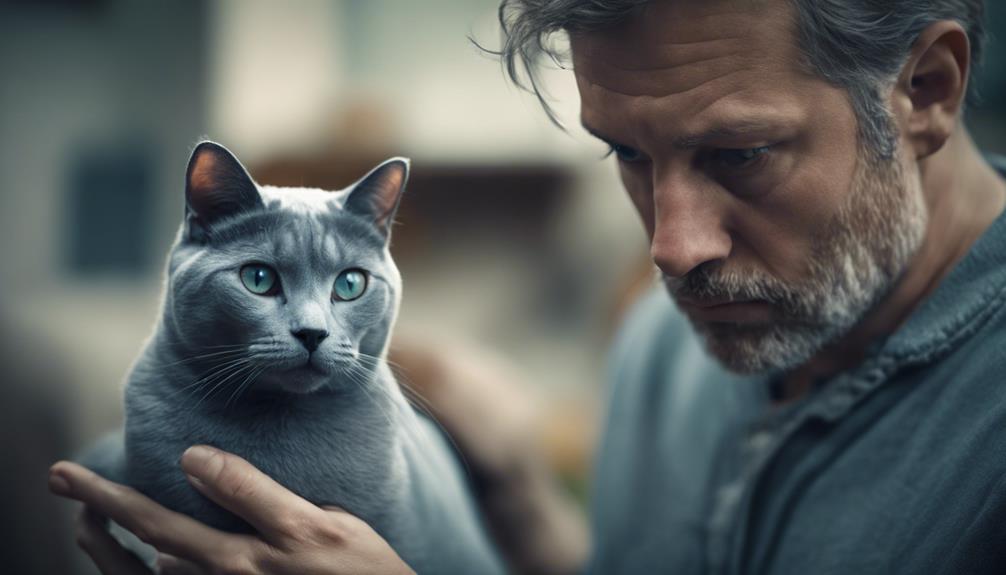
If you notice any of the following signs in your Russian Blue cat, it may be an indication that something is wrong with their health:
- Changes in appetite or weight
- Lethargy or decreased activity levels
- Vomiting or diarrhea
- Difficulty breathing or wheezing
- Changes in litter box habits
- Dull or unkempt fur
- Behavioral changes such as aggression or hiding
If you observe any of these signs, it is important to consult your veterinarian for a proper diagnosis and treatment plan. Regular veterinary check-ups can also help in detecting and addressing any health issues early on.
Common Health Issues in Russian Blues
Russian Blue cats commonly face a range of health issues, including dental problems, obesity-related conditions, eye issues, urinary tract diseases, and genetic conditions like polycystic kidney disease. When it comes to the health of this cat breed, urinary tract diseases stand out as a significant concern. Russian Blues are particularly prone to conditions such as feline lower urinary tract disease (FLUTD), cystitis, and obstructions in the urinary tract.
These urinary tract diseases can cause discomfort, pain, and potential blockages in Russian Blue cats, leading to serious health complications if not addressed promptly. Symptoms of urinary tract issues in Russian Blues may include frequent urination, straining to urinate, blood in the urine, and urinating outside the litter box. It's crucial for cat owners to be vigilant for any signs of urinary problems and seek veterinary care promptly to prevent further complications and ensure the well-being of their Russian Blue companions.
Weight Management for Russian Blues
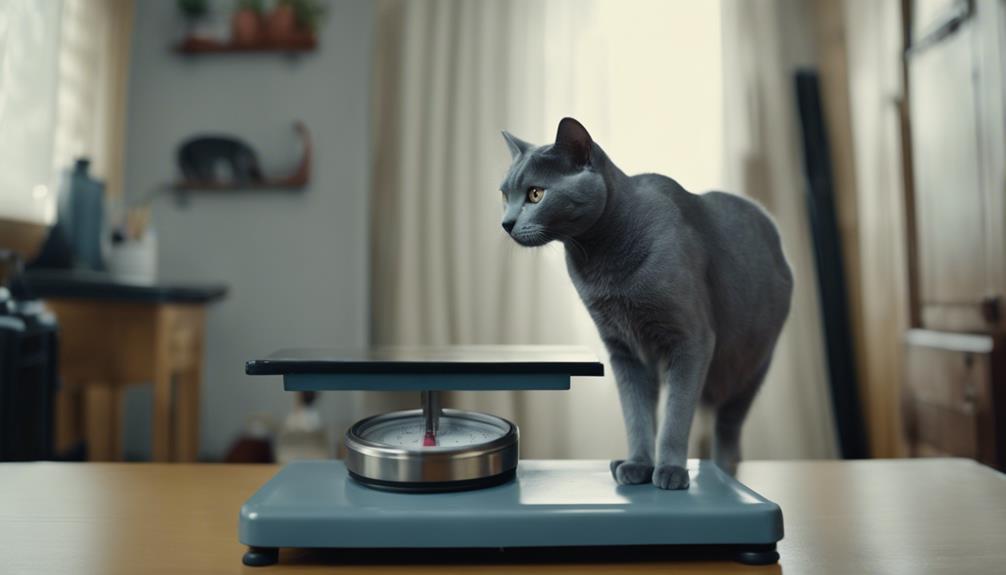
To ensure the optimal health and well-being of your Russian Blue cat, maintaining a healthy weight through proper diet and regular exercise is essential. Russian Blues are prone to obesity, which can lead to serious health issues such as diabetes and joint problems. Monitoring your cat's food intake and providing opportunities for physical activity are key in preventing weight gain. Regularly weighing your Russian Blue and seeking guidance from a vet on weight management is crucial.
Obesity not only affects the quality of life for Russian Blues but can also reduce their lifespan. Therefore, effective weight management practices are vital for the overall health of your Russian Blue. By staying proactive about their diet and exercise routine, you can help your Russian Blue maintain a healthy weight and live a longer, happier life.
Dental Care for Russian Blues
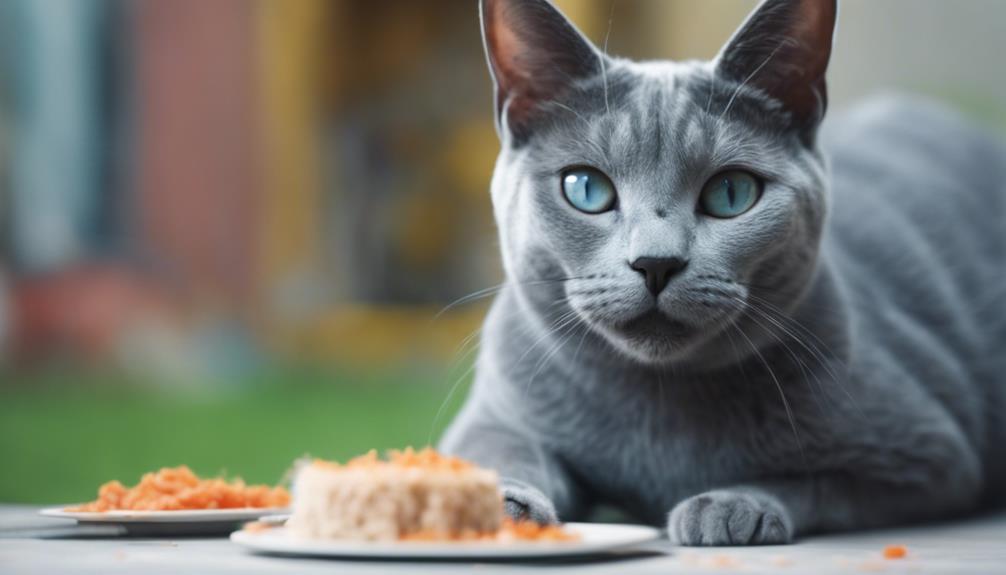
Regular dental care plays a crucial role in maintaining the oral health of Russian Blue cats.
Brushing their teeth regularly, scheduling routine vet check-ups, and offering dental treats can help prevent common dental issues.
These practices are essential for preventing serious health conditions that may arise from neglected dental care in Russian Blues.
Brushing for Oral Health
Maintaining oral hygiene through regular brushing is crucial for the overall health and well-being of your Russian Blue cat. To ensure your feline companion's dental health, consider the following:
- Brush your Russian Blue's teeth at least 2-3 times a week.
- Use a toothbrush and toothpaste specifically designed for cats.
- Focus on the outer surfaces of the teeth where plaque tends to accumulate.
- Monitor your cat's gums for any signs of redness, swelling, or bleeding after brushing.
Regular Vet Check-Ups
Ensuring your Russian Blue's optimal dental health and overall well-being necessitates regular veterinary check-ups. Dental care for Russian Blues should be a part of these check-ups, including routine cleanings, inspections for periodontal disease, and any necessary treatment. These visits are crucial for early detection of dental issues, preventing more severe health problems and discomfort for your feline companion.
Your vet will offer recommendations for specific dental care tailored to your Russian Blue's unique requirements during these appointments. Consistent dental care as part of regular vet check-ups is essential to preserving your Russian Blue's oral health and averting potential dental complications. Make sure to prioritize these check-ups to keep your Russian Blue happy and healthy for years to come.
Dental Treats for Cats
To support your Russian Blue's dental health, incorporating dental treats into their oral care regimen can be beneficial in reducing plaque and tartar buildup.
- Dental treats for cats, like Russian Blues, are designed to reduce plaque and tartar.
- These treats assist in cleaning teeth and freshening breath.
- They come in various flavors and textures to suit individual preferences.
- Regular use of dental treats can complement brushing and professional dental cleanings for optimal oral health maintenance.
Eye Health Concerns in Russian Blues
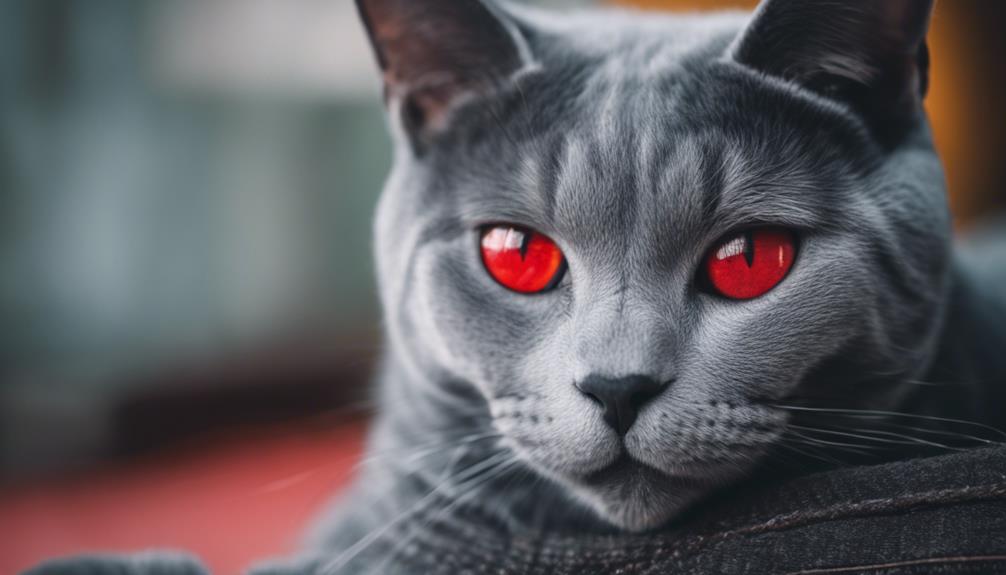
Russian Blue cats are susceptible to eye conditions like progressive retinal atrophy, which can impact their vision.
Recognizing early signs of eye health concerns, such as changes in appearance or behavior, is crucial for prompt intervention.
Regular monitoring and proactive care are essential to maintaining optimal eye health in Russian Blues.
Common Eye Issues
Regular monitoring of a Russian Blue's eyes is crucial due to their susceptibility to common eye issues such as conjunctivitis, glaucoma, cataracts, and retinal atrophy.
- Conjunctivitis: Inflammation of the outermost layer of the eye.
- Glaucoma: Increased pressure within the eye that can lead to vision loss.
- Cataracts: Clouding of the lens, affecting vision.
- Retinal Atrophy: Degeneration of the retina, impacting vision.
Early detection of these conditions is vital to preserving your Russian Blue's eyesight. Keep an eye out for symptoms like discharge, redness, cloudiness, or changes in behavior related to vision, and consult a vet promptly to address any concerns.
Prioritizing your Russian Blue's eye health can greatly contribute to their quality of life.
Preventative Care Tips
Maintaining a clean environment and scheduling regular veterinary check-ups are essential practices for ensuring optimal eye health in Russian Blue cats prone to eye issues such as conjunctivitis, glaucoma, cataracts, and progressive retinal atrophy. Regular monitoring for any changes in eye appearance, behavior, or vision is crucial in detecting potential issues early. Prompt veterinary care is necessary if symptoms like redness, cloudiness, excessive tearing, or changes in pupil size are observed. Progressive retinal atrophy, which can lead to gradual vision loss, highlights the importance of consistent monitoring and quick intervention. The table below summarizes key preventative care tips for maintaining good eye health in Russian Blue cats:
| Preventative Care Tips |
|---|
| Maintain a clean environment |
| Schedule regular vet check-ups |
Recognizing Symptoms Early
To safeguard your Russian Blue's eye health, vigilantly observe for early symptoms such as cloudiness, redness, or discharge that may indicate underlying issues requiring prompt veterinary attention.
- Watch for signs like squinting, excessive tearing, or changes in eye color.
- Check for dilated pupils, vision changes, or reluctance to open their eyes.
- Seek immediate veterinary attention if any eye-related symptoms are noticed.
- Remember that routine eye exams and timely treatment are vital for maintaining your Russian Blue's eye health and overall well-being.
Being proactive in recognizing and addressing potential eye health concerns can help prevent vision loss and ensure your feline companion's optimal quality of life.
Urinary Tract Health in Russian Blues
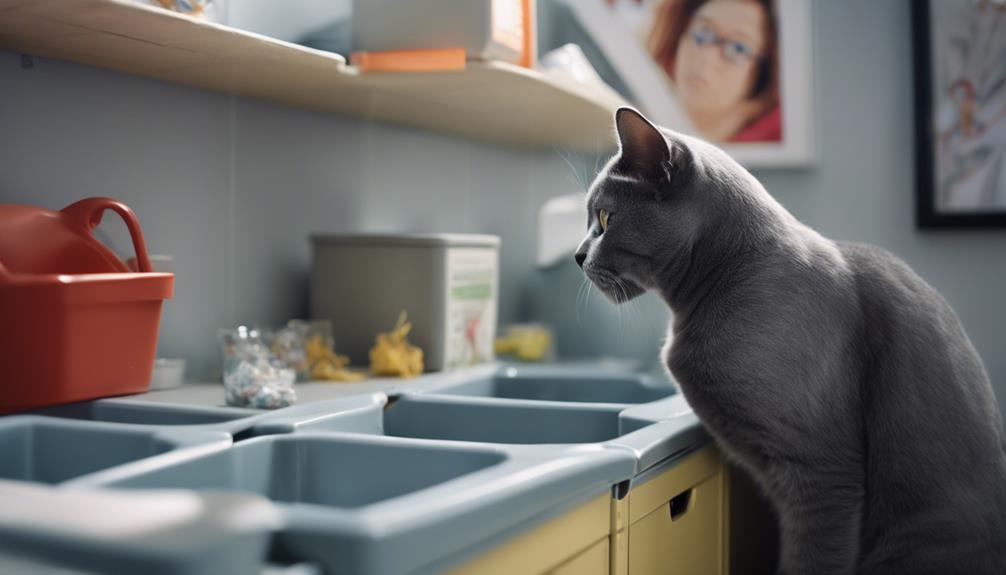
How do urinary tract issues impact the health of Russian Blue cats, and what're the common symptoms associated with these conditions?
Russian Blue cats are prone to urinary tract problems, including FLUTD (Feline Lower Urinary Tract Disease), attributed to their genetics and diet. Symptoms of urinary tract issues in Russian Blues may manifest as frequent urination, straining during urination, presence of blood in the urine, and inappropriate urination outside the litter box. Factors such as stress, dehydration, and urinary tract infections can exacerbate these issues.
Prompt veterinary attention is essential upon noticing any signs of urinary tract problems in your Russian Blue, as these conditions can be painful and severe if left untreated.
To maintain good urinary tract health in Russian Blue cats, implementing preventative measures like ensuring access to fresh water, providing a balanced diet, and scheduling regular veterinary check-ups are crucial steps that can help prevent the onset of urinary tract issues and promote overall well-being.
Heart Health for Russian Blues
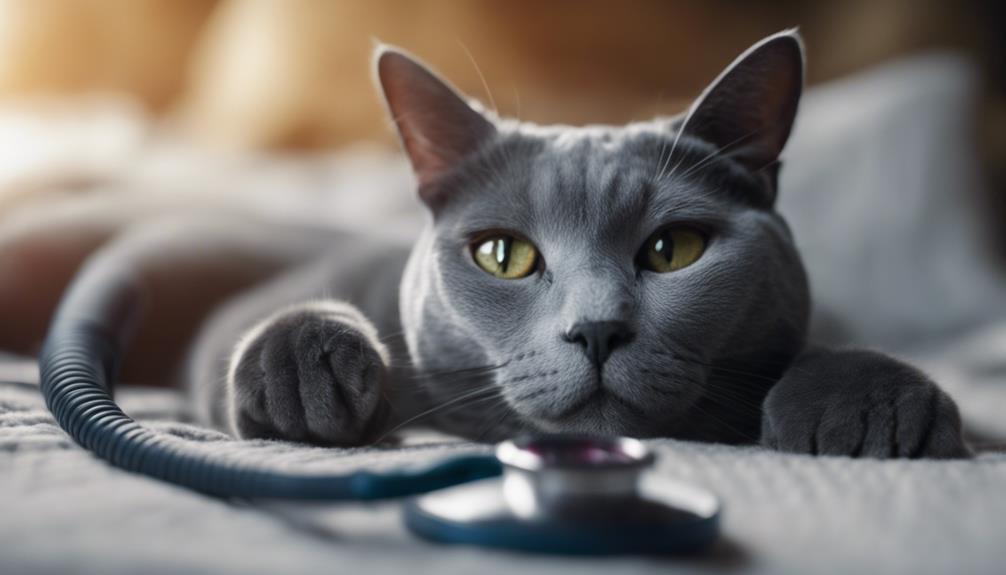
Heart disease, particularly hypertrophic cardiomyopathy, poses a significant health risk for Russian Blue cats.
Regular veterinary check-ups are essential to monitor heart health in Russian Blues.
Hypertrophic cardiomyopathy, a common genetic condition, can manifest with symptoms like irregular heartbeats.
Watch for signs such as lethargy and difficulty breathing, indicating potential heart issues in Russian Blues.
Arterial thromboembolism, a severe complication of heart disease, requires immediate veterinary attention in affected cats.
Understanding the nuances of heart-related conditions is crucial for Russian Blue cat owners to safeguard their pets' well-being.
By staying vigilant for any concerning symptoms and seeking prompt veterinary care, owners can help manage heart disease risks in their beloved Russian Blues effectively.
Regular preventive care and early detection play key roles in maintaining the heart health of these beautiful feline companions.
Genetic Predispositions in Russian Blues
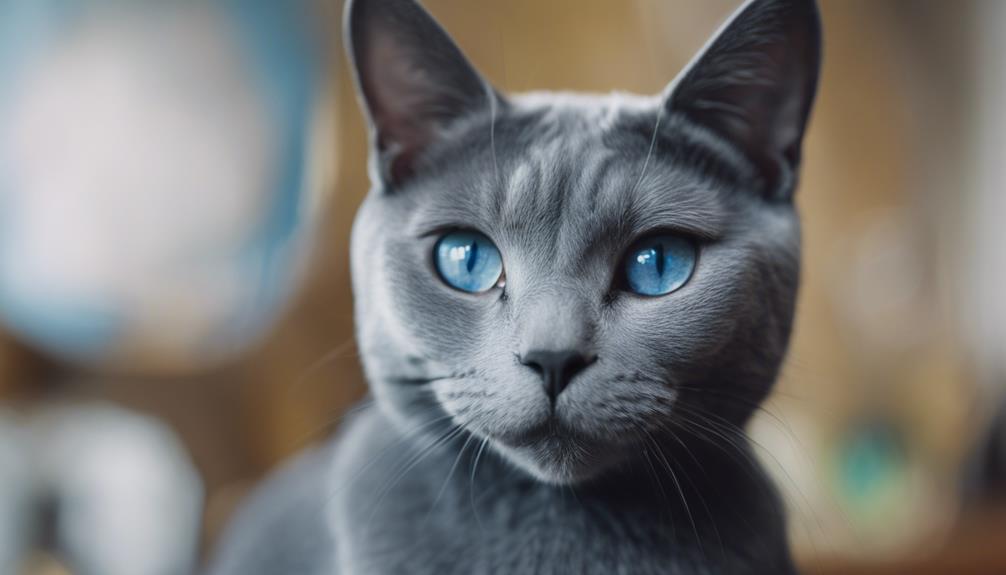
With a reputation for overall good health, Russian Blues exhibit minimal genetic predispositions to inherited diseases. This breed is generally healthy, with no known genetic health issues specific to them. Responsible breeding practices play a significant role in maintaining the overall health and genetic soundness of Russian Blues.
While they've a low genetic predisposition to sickness, routine veterinary care, including regular monitoring and check-ups, is crucial for the early detection of any potential health conditions. By staying proactive in their healthcare, owners can ensure that their Russian Blues lead healthy and long lives.
Despite the breed's low risk for inherited diseases, regular veterinary care remains essential to address any health concerns promptly. Through proper care and attention, Russian Blue owners can help their feline companions stay happy and healthy for years to come.
Frequently Asked Questions
Do Russian Blue Cats Have Health Problems?
Russian Blue cats may experience common ailments like dental issues, obesity, and kidney disease. Despite low genetic predispositions to inherited diseases, regular vet check-ups are essential for maintaining their health and detecting potential problems early.
What's the Life Expectancy of a Russian Blue Cat?
Russian Blue cats typically live 12-15 years, with some reaching 20. They benefit from a balanced diet, regular exercise, and preventive care to ward off common illnesses like polycystic kidney disease. Maintaining their health ensures longevity.
What Is the Healthy Weight for a Russian Blue Cat?
An ideal weight for a Russian Blue cat typically falls between 7 to 12 pounds. To maintain this, ensure proper diet requirements and regular exercise. Consulting a vet for personalized guidance can help keep your feline friend healthy.
Why Does My Russian Blue Talk so Much?
Russian Blues talk a lot due to their communicative nature. Their vocal behavior serves as a way to interact with humans, seek attention, or express needs. Understanding their communication patterns and feline speech helps owners decipher messages effectively.











